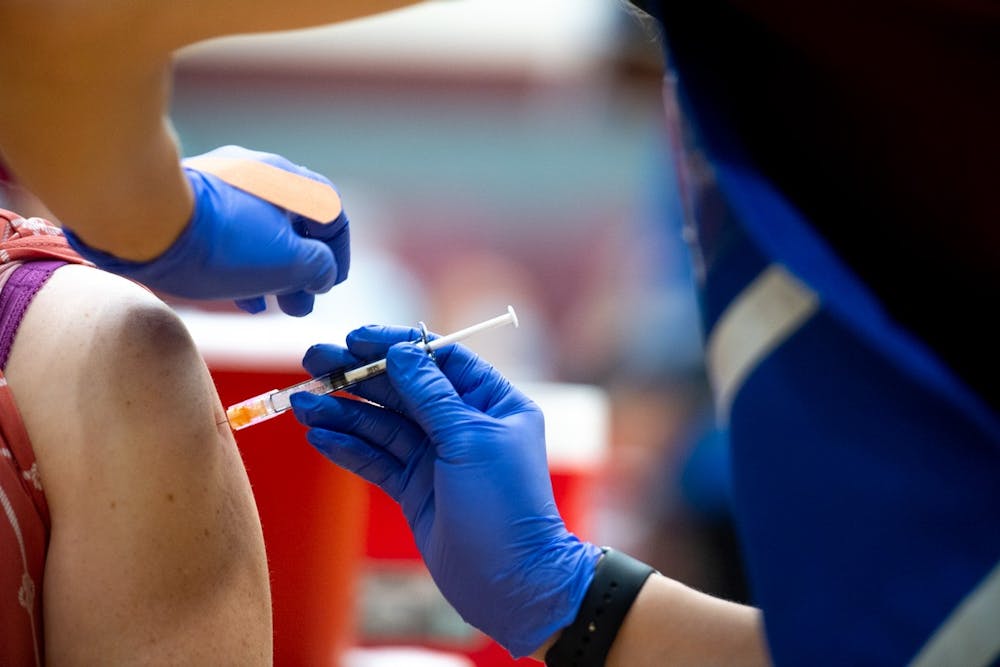After a long year of suffering, the development of the COVID-19 vaccine was a ray of hope in the darkness that was 2020.
Pfizer and Moderna offered an end to the raging pandemic that has left over 400,000 Americans dead, hospitalized many more and forced most of us to bunker down in our homes.
The massive failure in the distribution of the vaccine, however, has crushed this hope for many Americans who are now nervously stuck in limbo as they await their turn to be inoculated.
The reason for the delay? Prioritization.
Health officials recommended a prioritization schedule that planned who would get the vaccine and when they would get it, but the inability to implement the schedule and the reliance on state governments to be in control has made for a disastrous rollout.
The government has not only distributed the vaccine inefficiently thus far, but it has also created massive inequity in who has been vaccinated.
Despite contracting the coronavirus at significantly higher rates, Black, Asian and Hispanic Americans are significantly less likely to have received the vaccine thus far, according to data from KFF, partially due to the prioritization of health care workers and teachers.
The prioritization schedule has also slowed distribution rates because of the need to determine eligibility of those who apply for an appointment. The appointment system designed by the Arizona Department of Health Services is abysmal.
"The biggest mistake the state has made is that the appointment-making system has been bad. They rolled out the system for the vaccine just two days before it went live," said Will Humble, executive director of the Arizona Public Health Association.
The ADHS, led by Dr. Cara Christ, advised local health departments that they should not make their own appointment systems. Following this, the ADHS released an untested system that was inefficient and difficult to navigate.
"Everyone who's ever worked with a computer knows (things) never just go live," said Humble, the former ADHS director. The rapid release of the ADHS's appointment system attests to the need for proper research and testing prior to rollout.
Setting up an appointment is difficult for anyone, especially those who are working or caring for children and have limited availability themselves. Additionally, the appointments are often filled within hours of being posted, thereby leaving many without the opportunity to schedule in the first place.
Both of these issues disproportionally affect people of color and restrict their access to the vaccine — and the disparities will only escalate once the vaccine is available to the general public.
The system created by ADHS also inequitably favors wealthy Arizonans because most available appointments are drive-thru, which creates issues for Arizonans who do not own a car or rely on public transportation.
Although it is true that there are numerous other issues causing the poorly coordinated distribution of the vaccine, such as the ineptitude of former President Donald Trump's administration in ordering the vaccine, prioritization was an issue that could be changed at any point in the distribution. It must change quickly, not just for this pandemic, but for all health care decisions made in the future.
The vaccine distribution should have been a beacon of hope for those who have faced loss and hardship over the last year, but it has yet to reach the populations who need it most.
Health officials should have taken race, income and lifestyle into consideration while creating the prioritization lists and groups. There's still time to make the vaccinations more accessible before the inoculation process becomes available to the general public.
We need to consider the ramifications this pandemic has had on all communities in the nation, so that the next time we face such a dire crisis we don't make the same mistakes.
Reach the columnist at tkgerald@asu.edu or follow @TKGeraldMusic on Twitter.
Editor’s note: The opinions presented in this column are the author’s and do not imply any endorsement from The State Press or its editors.
Want to join the conversation? Send an email to opiniondesk.statepress@gmail.com. Keep letters under 500 words and be sure to include your university affiliation. Anonymity will not be granted.
Like The State Press on Facebook and follow @statepress on Twitter.
Continue supporting student journalism and donate to The State Press today.




